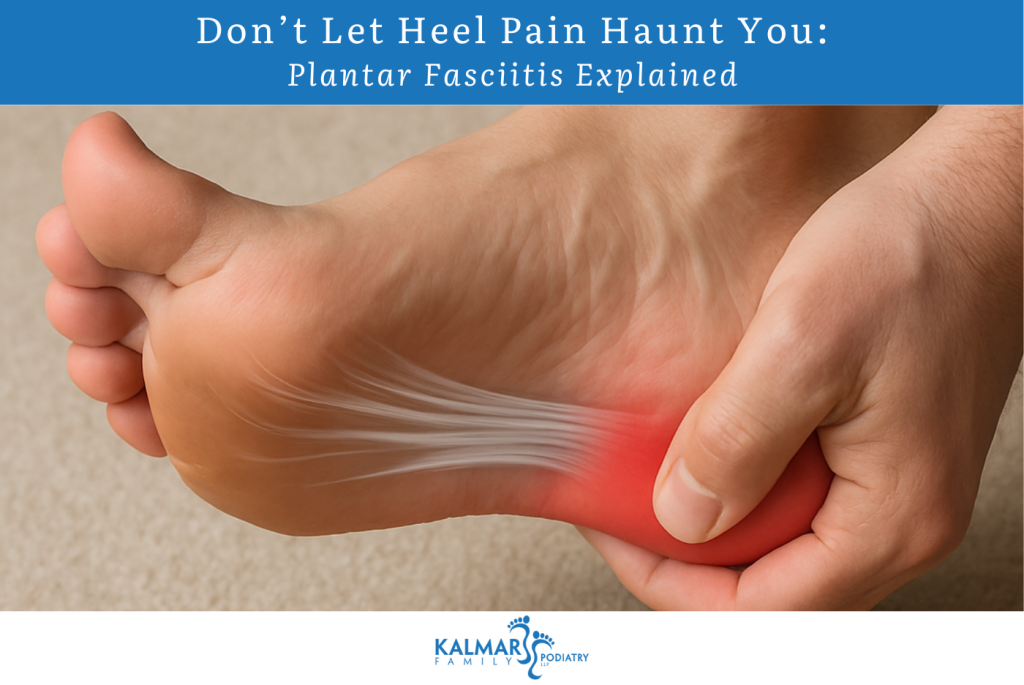
Heel pain can make even simple daily activities feel challenging. One of the most common causes of persistent heel discomfort is plantar fasciitis—a condition that affects the thick band of tissue supporting the arch of your foot. By understanding what causes plantar fasciitis, how to recognize it, and the treatment options available, you can take the first step toward lasting relief.
What Is Plantar Fasciitis?
Plantar fasciitis is an inflammation of the plantar fascia, the strong ligament-like tissue that runs from the heel bone to the toes. This tissue helps support the foot’s arch and absorbs shock while walking. When it becomes overstretched or strained, tiny tears can develop, leading to irritation, swelling, and sharp heel pain.
Common Causes
- Repetitive Impact: Activities such as running, dancing, or sports that involve jumping
- Foot Mechanics: Flat feet, high arches, or an abnormal gait pattern
- Inadequate Footwear: Shoes without proper arch support or with worn-out soles
- Lifestyle & Age: More common in people ages 40–60 and those who stand for long periods or carry excess weight
Symptoms to Watch For
Plantar fasciitis typically causes:
- Sharp, stabbing heel pain, often strongest with the first steps in the morning
- Discomfort after standing for long periods or after intense activity
- Tenderness along the bottom of the heel or arch
The pain often eases after walking but may return after extended standing or sitting.
Treatment Options
- Rest and Ice: Reduce inflammation and give the tissue time to heal
- Stretching Exercises: Focus on the calves and plantar fascia to improve flexibility
- Supportive Shoes & Orthotics: Cushion and support the arch to reduce strain
- Physical Therapy: Strengthening and mobility programs tailored to your needs
- Advanced Interventions: Ultrasound Guided Corticosteroid injections or other treatments if pain persists
- Early treatment is key. Ignoring symptoms can lead to chronic pain or changes in how you walk, which may affect your knees, hips, or back.
Q&A: Understanding Plantar Fasciitis
Q: Will plantar fasciitis go away on its own?
A: Mild cases can improve with rest and proper stretching, but professional care helps prevent it from becoming chronic.
Q: How long does recovery usually take?
A: With consistent treatment, many patients see significant improvement within 6–12 weeks.
Q: Can I prevent plantar fasciitis?
A: Yes. Maintain a healthy weight, wear well-cushioned shoes, and stretch your calves and arches daily—especially if you’re active.
Q: When should I see a podiatrist?
A: If heel pain lasts longer than two weeks or worsens despite home care, professional evaluation is recommended.
Contact Kalmar Family Podiatry
If heel pain is slowing you down, expert care can help you find relief and get back to the activities you love.
Kalmar Family Podiatry
📍 Address: 62 Green Street, Huntington, NY, 11743
📞 Phone: (631) 549-0955
🌐 Website: kalmarfamilypodiatry.com
Schedule an appointment today to create a personalized treatment plan and say goodbye to heel pain for good.
